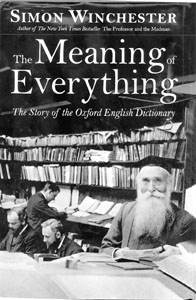![[Metroactive Books]](/books/gifs/books468.gif)
[ Books Index | Silicon Valley | Metroactive Home | Archives ]

Words Without End Simon Winchester tracks the history of the OED, the bible of the English language By Gary Singh WITH NEARLY flawless narrative technique, Simon Winchester, author of The Professor and the Madman, tells the convoluted history of the Oxford English Dictionary--that 20-volume monster one sees in every library--in his new book. The Meaning of Everything is a passionate celebration of the English language and a sparkling account of the definitive English dictionary. Winchester begins with the rationale behind the OED: English is a constantly evolving language, so a useful dictionary can never be prescriptive, that is, something that just records and catalogues the language, dictating how, where and when a word should be used. Instead, a dictionary should be descriptive, depicting a word's history, its biography and how it evolved. Rather than insisting on how a word should be used in the future, a dictionary should document how others have used it in the past. Continuing, Winchester tells how Dean of Westminster Richard Trench first discussed with his peers in the Philological Society the need of a new, all-encompassing dictionary because previous attempts were simply not good enough. Trench declared, "A dictionary is an historical monument, the history of a nation contemplated from one point of view--and the wrong ways into which a language has wandered may be nearly as instructive as the right ones." That was 1857, and the OED's eventual success would lie in the fact that it was "not the prescriptive invention of one man, nor even of a small number of men, nor of a committee." On the contrary, the project would require hundreds of enthusiastic volunteers to pore through nearly every book ever printed to extract quotations. Those involved with the project thought it would take about 10 years. Instead, it took 70. What follows is an intricate tale of several eccentric personalities involved with the dictionary's creation: James Murray, a lexicographer with no higher education who developed the basic plan and led the project; William Minor, the "Madman" of The Professor and the Madman, who submitted all his entries from a mental institution; and a young J.R.R. Tolkien, who worked on words beginning with "W" and labored intensely over the history of the word walrus. But The Meaning of Everything is not just for word mavens. It is a human story, an account of unsung, flawed heroes who labored for years to bring the whole project to an amazing conclusion. We get a wonderful glimpse of Murray, with his academic cap and long white beard, buried away in his "Scriptorium," a corrugated iron shed with tens of thousands of quotation slips jammed into wooden pigeon holes that cover every vertical surface in the shed. Unfortunately, Murray never lived to see the project out to its end. He died in 1915, and the dictionary wasn't finished until 1928. The first two complete 12-volume sets were presented to King George V of England and President Calvin Coolidge. Simon Winchester will be in residence at San Jose State University for the spring semester as the 2004 Lurie Chair in Creative Writing, but fans can catch up with him this week at Kepler's.
Simon Winchester appears for a booksigning on Friday (Nov. 7) at 7:30pm at Kepler's Books, 1010 El Camino Real, Menlo Park. Books must be purchased at Kepler's to enter the signing line.
Send a letter to the editor about this story to letters@metronews.com. [ Silicon Valley | Metroactive Home | Archives ]
|
From the November 6-12, 2003 issue of Metro, Silicon Valley's Weekly Newspaper.
Copyright © Metro Publishing Inc. Metroactive is affiliated with the Boulevards Network.
For more information about the San Jose/Silicon Valley area, visit sanjose.com.